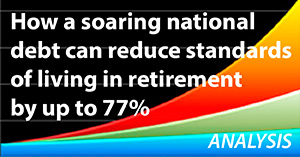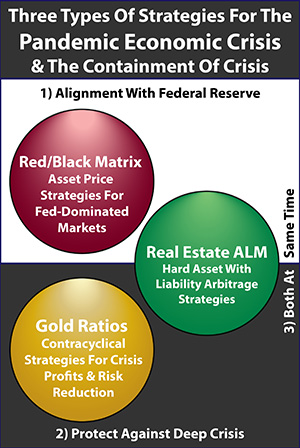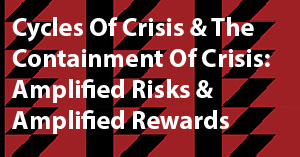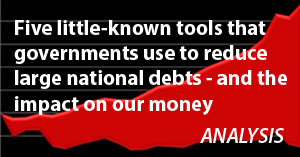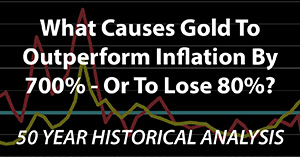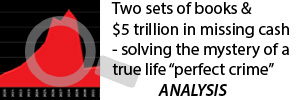Thinking Through The Unimaginable: America After The Fall Of King Dollar
By Daniel R. Amerman, CFA
TweetWhat are the practical economic and investment implications if the dollar loses its reserve status? As political leaders around the world pledge to begin de-dollarization, even as people such as Janet Yellen and Larry Summers talk about the potential loss of dollar hegemony and the global economy fragmenting - the possibility of one of the biggest economic changes of our lives is becoming quite real.
Below is a draft of my detailed presentation notes for the start of the second day of the upcoming May 13-14 workshop. For those of you who will be there, this introduction will set the stage for the rest of the "Solutions" day.
I hope that these notes will also provide significant value for those who will not be there. Some fundamental changes may be on the way, markets and investments would likely be dramatically impacted, and the time to start thinking through the many implications is before it happens.
Thinking Through The Unimaginable: America After The Fall Of King Dollar
(Please note that these notes are not the presentation itself, but are merely the framework for the presentation, with greater detail in the oral presentation as well as the frequent questions from and discussions with the group.)
- We covered a lot of ground yesterday, and that included analysis of the three sources for the reserve status of the dollar, including 1) National Interests; 2) Markets; and 3) Mechanics
- As we reviewed, the US dollar is currently facing unprecedented potential challenges in all three areas, with this three way combination being in play at the same time being the most unprecedented part of all
- Separately, as we also reviewed, there is a good deal of economic risk currently in the world as a result of the differences between the US and China over Taiwan, as well as the possibility of significant escalation in the current proxy war between the US and Russia
- This does not mean that a loss of reserve status is at this point guaranteed to happen
- However, I think it is fair to say that it is reality-based to discuss a potential loss of reserve status for the dollar in the 2020s, and perhaps sooner rather than later
- This is no longer a fringe belief, but something that many people are now seeing as being quite possible, particularly as the leaders of more and more nations around the globe are openly stating their intentions to participate in De-Dollarization
- This is also reinforced by recent statements from people like Larry Summers and Janet Yellen, with Summers acknowledging that the globe is fragmenting and realigning - with ours not apparently being the largest fragment - while Yellen spoke of the potential loss of dollar hegemony due to the Russian sanctions
- So, we have a strong chance that we will be seeing one of the biggest economic changes of our lifetimes, and it is already in process, though not yet unstoppable
- If that were to happen, with the dollar no longer being the reserve currency in a multipolar world - what would the practical economic and investment implications be? Fair question to work through in advance?
- The American economy and financial system are arguably based upon the implicit assumption that the US dollar will always be either a reserve currency, or the reserve currency for the world
- The assumption may not be stated, but it is everywhere
- The markets, the financial system, retirement planning (including Social Security), the supply chains needed to support our daily standards of living, the fundamental business structure of almost every major business including manufacturers and retailers - all are built upon the assumption of the United States having “exorbitant privilege” into the indefinite future
- That the assumption exists can be seen by withdrawing the assumption - and seeing how everything breaks, as we will be doing this morning
- The potential end of the reserve status of the dollar is a hypothetical that is almost literally unimaginable for most investors and business managers, other than as some kind of fantastic doom & gloom, financial apocalypse scenario
- If it happens, however, it won’t be the end of the world by any means
- The sun will still rise, we will still roll out of bed in the morning, we are still likely to be working, we will still need food & shelter
- The difference is that we will be living in what is now normal for most of the world population, and what has been normal for most of humanity throughout history - and this could be true for the rest of our lives
- As a society we will have lost the exorbitant privilege of being able to indefinitely run enormous trade deficits, relying on the rest of the world to send us vast amounts of imports where we do not actually produce enough exports to pay for them
- On a closely related note, we will have lost the exorbitant privilege of running up fantastic national debts, and having other nations around the world help pay for them through buying trillions in Treasuries
- This is not an ending - I hope and believe that the America that comes out of this on the other side will remain one of the top two economic powerhouses of the world
- We will still be a wealthy, technologically advanced nation with a developed infrastructure, a vast work force and abundant natural resources
- Yes, the daily standard of living will likely be at least somewhat reduced - and possibly quite a bit - for large segments of the population, but there will still be wealthy people, middle class people and poor people
- The specifics of who is in each of those categories is likely to change greatly, however
- There will indeed likely be an extinction event when it comes to many traditional investment and financial planning strategies, as well as quite a few companies and careers
- This ending will also open up many new beginnings when it comes to investments, financial strategies, companies and careers
- Great wealth will be destroyed, great new wealth will be created in different places
- Another way of phrasing this is that exorbitant privilege has created fundamental and pervasive distortions in the US economy and markets, and those distortions will necessarily need to be corrected as the US adapts to the loss of exorbitant privilege
- The end of the distortions could be catastrophic for some investments, careers and world views
- On the other hand, for those who are able to participate in the corrections through investments and/or careers, this time of upheaval can be a time of tremendous economic opportunity
- To identify the distortions and corrections, we will need to dive deep into something inherently unstable, which is the current components of GDP and trade balances - our economic system cannot pay for itself absent exorbitant privilege
- What the day to day standard of living for the average American is based upon - and most importantly how we as a nation actually pay for that - are quite different than how they are generally presented
- When we look at the *specifics* of imports and exports this morning, and compare them to the components of our internal GDP, what we will find is that what we produce internally and how we value it is fundamentally incompatible with what the rest of the world demonstrably wants from us - and it is only exorbitant privilege that has allowed this distortion to exist
- Correcting the distortion of an unsustainable trade balance is not rocket science, many nations have faced problematic trade deficits before, curing them requires increasing exports and/or decreasing imports
- As we will be reviewing, the implications for inflation and interest rates are also not rocket science, many nations have also been here before, but these implications are outside of the “Overton Window” for both the current general market assumptions and retirement financial planning, almost no one is prepared to handle what logically comes next if reserve status is lost
- Absent exorbitant privilege, we have to find ways to give the rest of the world more of what it actually wants (increasing exports)
- To correct will require changing our external balance of trade in a number of categories, which will require a fundamental rearrangement of the components of our internal GDP, some of which will be lucrative for those involved
- The other basic correction tool is for the US to reshape its economy to internally produce much more of what it needs (decreasing imports), which will also require a fundamental rearrangement of the components of our internal GDP
- In theory, closing our current trillion dollar annual trade gap via increasing exports and decreasing imports while maintaining (most of) our high standards of living should be quite feasible, within the range of what a determined United States can do within 3-5 years, but the urgent national priority to make it happen has to be there (starting now) - and it will require a high degree of competent execution, even as it interferes with established political patronage & belief systems
- This is all fixable, these are not intractable *economic* problems for an economic powerhouse like the United States, there is just some restructuring of the US economy that needs to be done
- The future does not need to be Doom & Gloom, even with a loss of reserve status, though it will be different from today
- However, the third option is what will happen if corrections aren’t successfully made, and that is imports are reduced without replacement, which would lead to precipitous declines in standards of living given our current inability as a nation to produce so much of the specific physical goods that our daily standards of living depend upon, but which we cannot currently produce
- Critically, without exorbitant privilege, neither Federal Reserve monetary games nor US government borrowings can close the gap
- Our “magic money” tools stop working externally, internal debts and money creation can’t bring in the imports on their own anymore, that was a reserve currency privilege that was both relied upon and abused
- People have become so used to irresponsible government policies of digitally creating a trillion dollars in debts here, and a trillion there, that many can’t even comprehend how a nation pays for a trillion a year in physical goods that daily life absolutely depends on, if we don’t have the money because we don’t sell enough in exports, and the sellers will no longer take our infinite supply of digital debts in exchange
- The same applies to the parts of the US population and economy that are addicted to fantastic levels of government deficit spending - the economic reality check is simply incomprehensible to the markets and the political class
- Also keep in mind the potential revolutionary implications for Social Security - saying the government will have no political choice but to honor the promises, regardless of the costs, is reserve currency thinking
- The necessary corrections will fly straight into the face of the current political and economic Narrative about how wealth is created in America and who creates it
- The necessary economic corrections will also likely clash with some current Climate Change policy objectives on a fundamental level - they are outside of the accepted discussion and assumptions
- (As a political side note, the longer that established political interests resist the corrections, trying to extend a failed Narrative while no longer being physically able to pay for it, then the greater the reduction in the average personal standard of living for the nation, and the greater the potential for political unrest)
- In general, there are “easy” and “hard” ways of doing this. Make the necessary economic changes (with the resulting fundamental investment changes), avoid crisis, close the trade gap, stop the enormous budget deficits, and the US remains an extraordinarily wealthy economic powerhouse, albeit without its previous unique financial privileges
- If we don’t change the economy, or avoid crisis, or close the trade gap, or stop the enormous budget deficits, then we get the “hard way”, which would be painful indeed compared to our current situation
- These issues bring us back to #4, “major changes, incompetently executed” – in theory, everything can be solved (with some considerable investment and financial pain along the way), but in practice, can our current leadership competently manage such major changes?
- As we will discuss, the degree of interim pain during the correction process would likely depend on the speed of the fall, with a multi-year process being much easier on the US and the rest of the world, while an abrupt end via war or financial crisis could create chaos in the US and abroad (in other words, does the dollar go out with a whimper or a bang?)
- The other critical question is whether the dollar itself crashes, or retains much of its value, but is no longer the sole reserve currency with exorbitant privilege
- However it begins, the implications will also create a financial revolution when it comes to inflation, interest rates, stock valuations (particularly in specific sectors), bond valuations, real estate valuations and precious metals valuations - with numerous winners and losers
- Indeed, as we will explore, the two-part combination of fundamental economic and interest range changes will turn the investment assumptions of the last 15 years upside down in many cases, as the previously “hot” areas are devastated, even while there is a fundamental move to a quite different type of investment strategies, that could dominate for decades to come
- We will be spending most of today going through three quite different categories of investment strategies, three categories of solutions, and as one part of a much broader exploration, we will take a look at how each type of strategy would be impacted by the dollar losing its reserve status
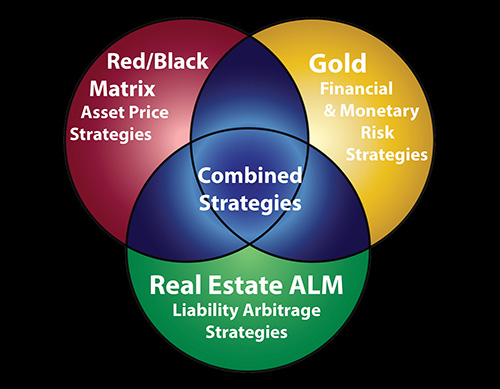
- Indeed, as we will be discussing in detail, with all three categories of investment solutions, performance can be substantially better if reserve status is lost than if it isn’t
- The best time to explore and talk through all of these issues is before they happen
******************************************
The brochure for the May 13-14 workshop is linked below. There is still space available at this time.







